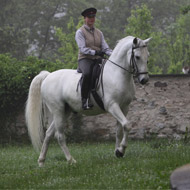
Study shows overwhelming influence of breeding schemes
Almost all modern horses descend from recently imported oriental stallions, according to new research.
The paper, published in Current Biology, shows the overwhelming influence of breeding schemes driven by strong selection on males.
Armed with this new information, researchers say that it will be possible to shed light on the origin and relationship of any stallion line in detail.
“Apart from stallion lines in Northern European breeds, all stallion lines detected in other modern breeds derive from more recently introduced Oriental ancestors,” says Barbara Wallner at the University of Veterinary Medicine, Vienna.
“Our data, therefore, illuminate the enormous impact modern horse breeding strategies—characterised by strong selection of males and the import of Oriental stallions—during the past few hundred years had on Y chromosome diversity.”
In the study, researchers focused on a part of the Y-chromosome that is passed down from one generation to another. Any changes to that part are the result of new mutations.
"Since random mutations accumulate over time, males who originate from a common patrilineal ancestor will share a particular collection of Y chromosome mutations," Wallner explains, forming what's known as a haplogroup.
Until now, it has been difficult to reconstruct the history of stallions. This is because there is low diversity in the Y chromosomes of modern horses. To overcome this problem, researchers used deep, next generation DNA sequencing, allowing them to detect even the slightest changes.
Their analysis showed that the paternal lineages of various modern horses split much more recently than the domestication of the species, which dates back more than 5,000 years.
Minus a few private Northern European haplotypes, the authors report that all modern horse breeds included in the study clustered into a roughly 700-year-old haplogroup, transmitted to Europe by the import of Oriental stallions.
By linking the Y chromosome lineages with genealogical information derived from written records, the researchers say it’s now possible to define Y haplotypes for certain founder stallions.
“Our results pave the way for a fine-scaled genetic characterisation of stallion lines, which should become routine in the near future,” Walner concludes.
Image (C) Spanische Hofreitschule.



 The latest
The latest